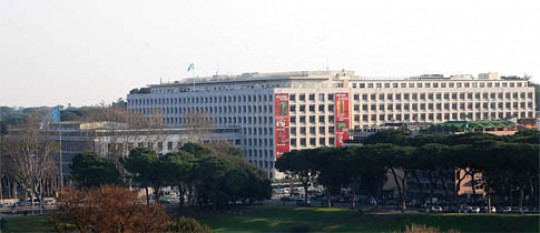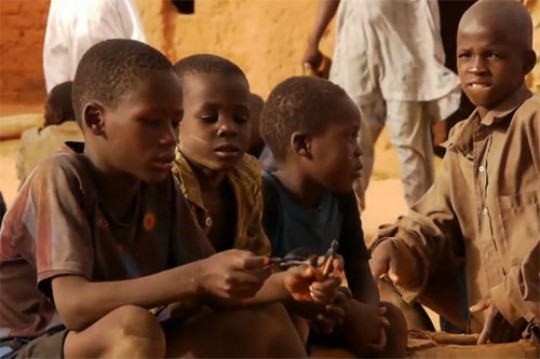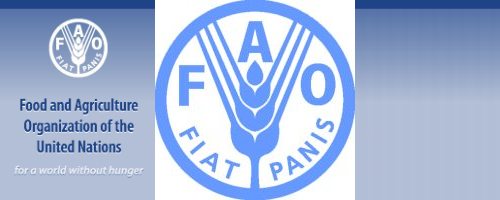Niger: UN agency boosts aid as a million people face urgent food crisis
Niger: UN agency boosts aid as a million people face urgent food crisis
28 October 2011
Gaëlle Sévenier, a spokesperson for the UN World Food Programme (WFP), told reporters in Geneva that $60 million is required to fund food aid interventions for the most vulnerable over the next six months, as the country grapples with an estimated deficit of 500,000 tons of cereals.
The number of people in need could rise to two million by the end of next year, she said.
The expanded food aid operation will be mainly carried out through cash and food-for-work projects, and boosting nutrition for children under the age of two, pregnant women and nursing mothers. The WFP relief effort already reaches, on average, half a million vulnerable people per month.
Frequent droughts in Africa’s Sahel region have meant that communities are being hit by shocks even before they have had time to recover from previous food crises. Vulnerable families are increasingly finding it difficult to replenish their household food stocks or build up their livestock herds, according to WFP.
The return of an estimated 200,000 migrant workers who used to send remittances to their families in Niger from Libya and Cote d’Ivoire has not only weakened the local economy, but has created an additional burden on communities already struggling to feed themselves.
The agency said it was also closely monitoring the situation in Chad, Mauritania, and Burkina Faso. In Mauritania alone, an estimated 700,000 people are facing severe food shortages.
###
28 October 2011
WFP Calls For Early Action To Avoid Full-Scale Food Crisis In Niger
“The growing threat of food security in Niger is deeply worrying. The country appears to be heading towards a full-scale food crisis if early measures are not taken. Vulnerable families are still exhausted by the last crisis, barely a year ago, and they have little ability to confront another emergency.”
Denise Brown, WFP Niger Country Director, Niamey.
• Around one million people are in urgent need of food after a poor harvest in drought-hit Niger. The figure is likely to rise as the country moves towards the April-September lean season. Crop assessment results confirm a national cereal deficit of around 500,000 metric tons, worse figures than for the crisis years of 2005 and 2010.
• WFP is planning to scale up its operations in Niger urgently, increasing the numbers of people reached by cash and food-for-work projects, and boosting nutrition for children under age two, pregnant women and nursing mothers. WFP already reaches an average of 500,000 vulnerable people per month.
• The increasing frequency of droughts in the Sahel means that communities have not had time to recover from the last food crisis. Vulnerable families have had no time to replenish their household food stocks and build up their herds of livestock.
• The return of around 200,000 migrant workers who used to send remittances to their families from Libya and Ivory Coast has not only hit the local economy but has created an additional burden on communities already struggling to find food.
• WFP estimates it needs an additional US$60 million to provide food assistance to the most vulnerable groups for the next six months.
• WFP is closely monitoring the situation in other countries in the region and is concerned about the situation in Chad, Mauritania, and Burkina Faso. In Mauritania, WFP estimates that some 700,000 people are facing severe food insecurity, compared to 500,000 in previous years.
###
> UN Food and Agriculture Organization (FAO).
The Food and Agriculture Organization of the United Nations (FAO) is an intergovernmental organization and has 191 Member Nations, two associate members and one member organization, the European Union. Achieving food security for all is at the heart of FAO’s efforts – to make sure people have regular access to enough high-quality food to lead active, healthy lives.

FAO’s mandate is to raise levels of nutrition, improve agricultural productivity, better the lives of rural populations and contribute to the growth of the world economy.
The Food and Agriculture Organization of the United Nations (FAO) is working with its Members and the entire international community for achievement of the Millennium Development Goals.
These eight goals – each with specific targets and indicators – are based on the United Nations Millennium Declaration, signed by world leaders in September 2000. They commit the international community to combating poverty, hunger, disease, illiteracy, environmental degradation, and discrimination against women.
![]()
The eight Millennium Development Goals are:
Goal 1: Eradicate extreme poverty and hunger
Goal 2: Achieve universal primary education
Goal 3: Promote gender equality and empower women
Goal 4: Reduce child mortality
Goal 5: Improve maternal health
Goal 6: Combat HIV/AIDS, malaria and other diseases
Goal 7: Ensure environmental sustainability
Goal 8: Develop a Global Partnership for Development
* More information at UN Food and Agriculture Organization (FAO)
###
> United Nations (UN).
 The United Nations was established on 24 October 1945 by 51 countries committed to preserving peace through international cooperation and collective security. Today, nearly every nation in the world belongs to the UN: membership totals 192 countries.
The United Nations was established on 24 October 1945 by 51 countries committed to preserving peace through international cooperation and collective security. Today, nearly every nation in the world belongs to the UN: membership totals 192 countries.
When States become Members of the United Nations, they agree to accept the obligations of the UN Charter, an international treaty that sets out basic principles of international relations. According to the Charter, the UN has four purposes:
- to maintain international peace and security;
- to develop friendly relations among nations;
- to cooperate in solving international problems and in promoting respect for human rights;
- and to be a centre for harmonizing the actions of nations.
###
* The above story is adapted from materials provided by United Nations (UN)
** More information at United Nations (UN)






















